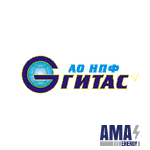The Technology of Separating Reservoirs and Determining the Coefficient of oil and gas Saturation by a Complex of Neutron Methods for Chlorine
Tasks to be Solved
- lithological dissection of the section;
- reservoir identification and porosity coefficient determination;
- determination of water-saturated porosity Kp · Kv from the content of chlorine in produced water, followed by determination of the oil and gas saturation coefficient Kng with the known porosity coefficient (Kp).
To implement the technology, SPRK digital spectrometric radioactive logging equipment is used, which performs measurements using a complex of methods: CISK spectrometric gamma-ray neutron gamma-ray logging, two-probe neutron-neutron logging based on 2NNKT thermal neutrons and integrated OGC. At the request of the customer, the method of spectrometry of natural gamma radiation GK-S can also be implemented in the equipment. The SPRK device was developed by NPP VNIIGIS together with ZAO NPF GITAS. The diameters of downhole tools of 90 and 48 mm allow them to be used to study wells through tubing.
Output geological parameters according to the results of processing:
- mass content of sodium chloride M (Cl), which reflects water-saturated porosity;
- Text coefficients of porosity, determined by the measurements of 2NNKt and NGK-60.
All methods implemented by the SPRK device have metrological and methodological support. The 2NNKT and NGK-60 probes in their geological and geophysical characteristics fully correspond to those implemented in standard radioactive logging equipment, which ensures the continuity of porosity methods. This advantage of the technology allows its use in monitoring the development of oil and gas fields. The results of the testing of the technology confidently confirmed its high geological information content due to the LPG method included in the proposed complex, especially in conditions of low salinity of produced water and in the study of the old stock of large diameter wells (295 mm). In addition, the presence of LPG technology in the technology makes it possible to take into account the influence of the material composition of rocks on the value of the oil and gas saturation coefficient and, thereby, increase the reliability of determining the nature of reservoir saturation. The technology has been successfully tested in the Republic of Kazakhstan, Bashkortostan, Perm Region, including in the conditions of directional and horizontal wells. The figure shows the results of a study of a well in the Perm Region.
NPP VNIIGIS OJSC and NPF GITAS CJSC deliver instruments and services to solve geological problems using the proposed technology.

